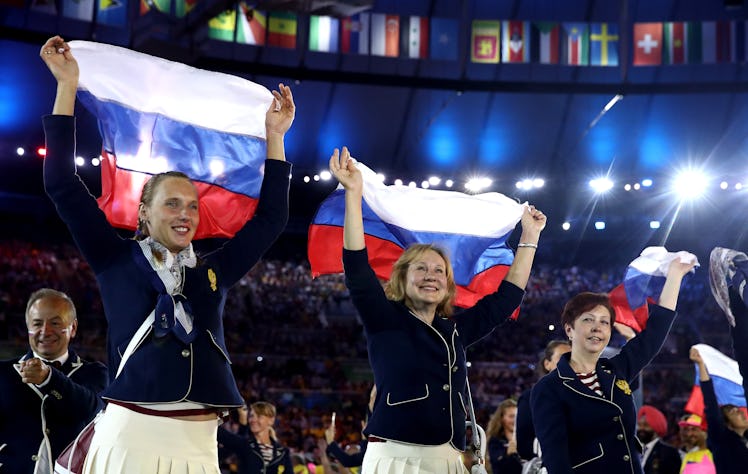
Russia’s Olympics Ban Is Serious, But They’re Not The First To Get Uninvited
The International Olympic Committee (IOC) dropped a bombshell on Dec. 5 when they announced that they were outright banning Russia from participating in the 2018 Winter Olympics in Pyeongchang, South Korea. The ban comes after the IOC found Russia guilty of running an extensive, state-sponsored doping program and interfering with the anti-doping lab in the 2014 Sochi games. The punishment is definitely harsh, but Russia isn't the first country banned from the Olympics. Not even close.
As recently as 2016, countries have been barred from participating in the Olympic games. Kuwait, for example, was banned from the 2016 summer games in Rio de Janeiro after the country passed a law allowing interference with national sports federations, an IOC "no-no," according to The Washington Post. Kuwaiti athletes were able to participate as neutrals under the Olympic flag — similar to stipulations for Russian athletes, though admittedly the requirements for Russia are much stricter due to the extent to which the country went to cheat in the 2014 games.
Similarly, India was banned for the first few days of the 2014 games in Sochi for corruption, according to the BBC.
But the practice of banning individual countries isn't anything new.
In fact, it dates back almost 100 years.
The 1920 games in Antwerp, Belgium — right after World War I ended — included 29 countries, according to the Olympic Games website. What they fail to mention, however, is who was barred from participating. According to Canadian Olympic Team's official website, the aggressors who started WWI — Germany, Austria, Hungary, Bulgaria, and Turkey — were not invited to the games.
Similarly, Germany and Japan, the Axis powers in World War II, were not invited to the 1948 games in London.
The longest ban probably goes to South Africa, which was banned from competing in any Olympic games for 28 years due to apartheid. In 1963, the committee announced that South Africa had until the end of the year to address racial discrimination in their country, or they would not be allowed to participate in the 1964 games in Tokyo. South Africa wasn't invited to participate until 1991 — just before the 1992 games in Barcelona.
The (kind of) country formerly known as Rhodesia, now known as Zimbabwe, was also banned from the Olympics in 1972. Rhodesia was formed as a whites-only government, and their racist politics led the IOC to outright ban them from the 1972 games in Munich, four days before the games began — thanks to uproarious protests from African countries. The country was dissolved and reformed as Zimbabwe before they had had a chance to compete again.
Plenty of other countries have been banned at various times in Olympic history, as well, including Taliban-ruled Afghanistan, which banned women from participating, and so was banned, in turn, by the IOC from the 2000 Sydney games. After the fall of the Taliban, Afghanistan was invited back to the 2004 games in Athens.
The IOC has a habit of using bans to respond to social ills.
This is perhaps why they felt it necessary to not only ban Russia, but to pass other sanctions, including a $15 million fine (which will reimburse the IOC for the investigation and contribute to the creation of an Independent Testing Authority). The IOC is making no secret of the fact that they are trying to send a message about doping.
Several officials associated with the 2014 doping scandal have been banned from participating in the Olympic games ever again. Numerous Russian athletes who were found to have been using performance enhancing drugs have had their medals vacated. Russian athletes who wish to participate in the 2018 games may only do so after going through a rigorous application process, proving they're clean, and they may only compete as neutrals, under the Olympic flag.
It may seem harsh on the face, but according to the IOC, Russia's cheating is "unprecedented." Russia has been found guilty of funding a large, state-sponsored doping program, the likes of which the world has never seen. The Russian Ministry of Sport was additionally found to have put together a team that, in the dead of night during the 2014 games, "tampered with more than 100 urine samples to conceal evidence of top athletes’ steroid use throughout the course of competition," per The New York Times.
After the IOC announced that it would ban Russia from the 2018 games, quite a few Russian athletes and government officials said the punishment was too severe, per both The Washington Post and The Moscow Times. For example, national ski jumping champion Irina Avvakumova reportedly said, “I don’t know how other athletes will react, but I haven’t trained for years to go somewhere to not compete on behalf of my country. It’s not sportslike to go to the Olympics just in order to be there."
IOC President Thomas Bach said of Russia's cheating, "This was an unprecedented attack on the integrity of the Olympic Games and sport." He called the sanctions "proportional" to the crime, "while protecting the clean athletes."